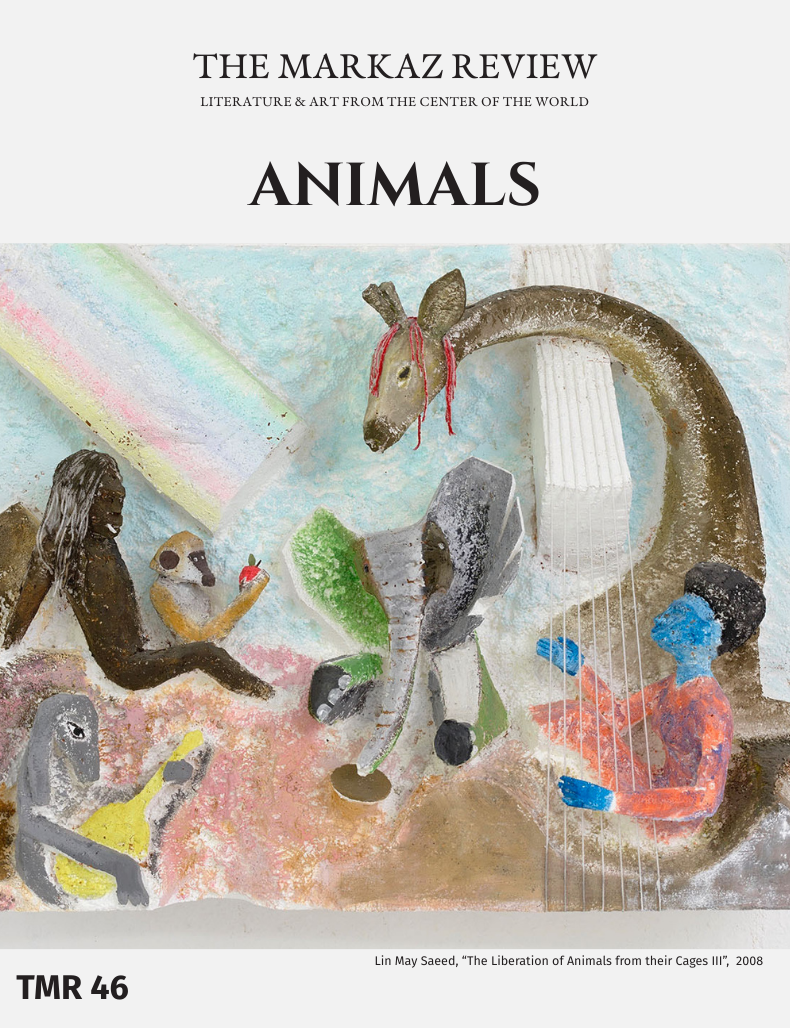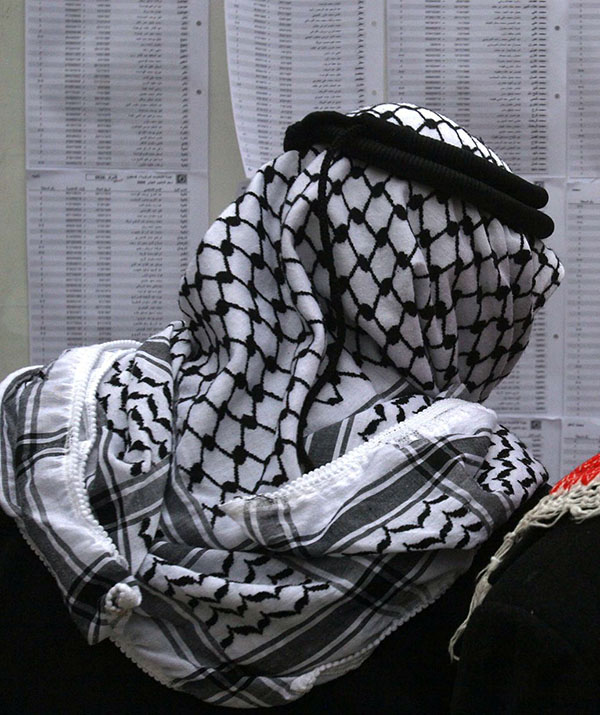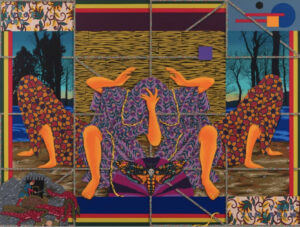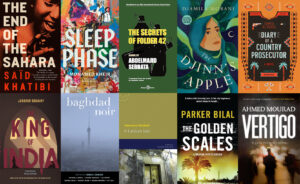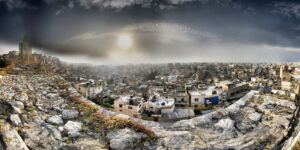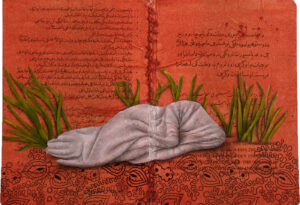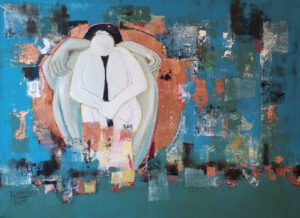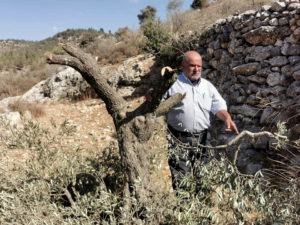A bombing in Gaza destroys an entire family except for the protagonist of the short story and his beloved dog.
Kamal woke up surrounded by rubble. The beige-hued sandstones in his grandfather’s home had been reduced to gray boulders. With only a gleam from the gaps between the rocks above him, Kamal briefly wondered if he was on the moon. Perhaps the Israelis had finally done it, and he had reached an unconventional heaven. However, with three of his limbs trapped under the rocks, it appeared unlikely he was in a celestial paradise. Kamal nimbly wriggled his left arm out, and with newfound mobility, he quickly removed the remaining regolith to examine himself and his surroundings. The bruising along his right side confirmed his wounds were worldly, and the demolition he had survived was neither a dream nor a site for purgatory. Rather, the bombing had brought down the ceiling in front of him, and Kamal was trapped in the house’s iwan. He had slept there last night with his dog, Habib, as it was the only corner of his grandfather’s home with no windows or exposure through the courtyard it faced. That thought startled Kamal, and his heart ascended to his throat. Only one question remained unanswered: where was Habib?
Kamal howled desperately, his hoarseness harshly bouncing back off the cratered walls into his ears. Panicked, he rummaged through the amalgam of rocks and shrapnel, begging God for any sign of life. As he circled in his spot, he scanned the floor with increasing efficiency, and his eyes adjusted to the dimness of the IDF-made cave. Underneath one of the surviving chairs, Kamal glanced and noticed the end of Habib’s leash. Jumping on it like a rabid cat over a mouse, he grabbed the handle and began tugging towards himself. Immediately, he heard a houndlike whimper, and a palpable relief filled the air. Kamal clawed through the sandstone as he excavated to find Habib, and his heart finally returned to his chest after feeling the first hint of fur. Gently, he took hold of Habib, and pulled him out of the wall and out of his misery. After patting the dust off the dog’s muzzle, back, and tail, Kamal’s hands leapt to the concealed pocket of his cargo shorts.
“It must be time,” Kamal reckoned aloud. “I’m so sorry I lost you, ya Habib. I’m here now.” He unbuttoned the pocket, removed his syringe and little bottle, and drew the clear liquid into the instrument. Without hesitation, Kamal injected Habib with his mandatory insulin, and immediately noticed a burst of life emerge in his best friend. The insulin worked, and Kamal reverted his attention to the wall of rocks blocking off the courtyard.
A mix of a German Shepherd and a Kanaani dog, Habib was synthesized in a breeding center that produced dogs for the IDF’s Oketz unit, but was abandoned because of his diabetes. According to Kamal’s father, Kanaanis were first introduced to Palestine by some Austrian woman, before they soon became Israel’s national dog. “They can’t even bring dogs from where they came from,” his father would always say. “Their place here is so unnatural that even their animals are against the Earth’s order.” Kanaanis were eventually seen as too stubborn to cooperate with soldiers, which led the Israeli government to take their experimentation further with other dogs to invent new breeds. “Eugenics” was a word Kamal would hear the adults use a lot whenever Habib was around them, and he never understood quite what they meant. Now 14, one year after he found his pet, Kamal still didn’t understand what the word alluded to, but vaguely got that it was in the realm of artificiality. Whenever dogs were dismissed from their training, the occupying forces would fill a truck with the undesirables, and drive them to the dog cemetery in Asqalan, where they would be left to starve. Habib, however, was a naturally nomadic soul. Upon his release from the truck, he immediately voyaged away from the cemetery, continuing south until he reached As-Siafa, where Kamal was playing football with his friends. By that stage, Habib was a ghastly shell of the military hound he was engineered to be, and Kamal immediately took him to the vet. An only child, Kamal lunged at the opportunity for company whenever his parents stopped him from playing outside, though when there was fear of a raid, Kamal’s family would not let him go even as far as the elevator in their apartment building. When the Israelis would cut the power in Gaza, they would go to his grandfather’s house in Zaitoun, where there was nothing to do but stare at the books on his shelf and sit and watch the courtyard from his iwan. No one could visit them there, either, as the exposed courtyard was the only remaining space when all rooms were occupied. That left them open not only to the elements, but also to the drones. These were always lonely experiences, which made Kamal’s case for keeping Habib rather straightforward. While his mother was incredibly resistant to the notion of any pet, let alone one as dirty as a mongrel, Kamal’s father agreed to it. From his standpoint, the soldiers would leave them all alone. “They would never risk killing their precious canines,” he decisively claimed. Kamal dutifully sided with his dad and the case was settled — Habib was his.
Kamal was finally able to open up a hole big enough for him and Habib to fit through, and he was back outside in his grandfather’s courtyard. With Habib at his side, he walked around to examine the damage the bombing had done to the house, and which rooms remained intact. It did not take long to discern that whatever had hit Kamal’s haven destroyed exactly one-half of it. Unfortunately, it was the half that contained the two largest rooms, leaving only the claustrophobic guest room intact on the other side of the courtyard. He walked over the rocks in search of remnants from his grandfather’s books. Although Kamal had never been much of a reader, he recalled his grandfather always telling him about the importance of books in preserving history. The sandstone from which the house was built was another constant reminder for Kamal about how the work of cultural preservation had to be embedded in every part of their lives. His grandfather would always claim that the material was used because of its fantastic ability to cool the area during the summer. Two hundred years ago, before the occupation and when Palestine was under Ottoman control, everything appeared to be simpler. “We were all one nation. There was no air conditioning or artificial concrete monstrosities,” his grandfather would lament, yearning for an era before he was even born. Kamal was always unsure if he was referring to the new buildings in the southern neighborhoods of Gaza or the walls erected throughout Palestine. The connection between the house’s structure and the Turkish people who ruled seemed peculiar, but Kamal was not particularly good at science in school to confirm if sandstone was an ancient cooling system, nor was he a gifted historian to know how different the Turks of yesteryear were to the Israelis of today. He figured maybe the books buried underneath the sediment could guide him to answers, but the search was proving futile.
The fact that Kamal had remained outside for so long would have raised his mother’s blood pressure and her voice, but her blood had dried and her voice could no longer be heard. In the previous week, his grandfather was over at his parents’ house, drinking tea with them while they watched the news. The glaring gold of the Al Jazeera logo was Kamal’s cue to excuse himself to walk Habib on their usual around Palestine Square and the Israa University campus. He promptly left to enjoy the good weather with his best friend. Merely 20 minutes into this walk, he was jolted to attention by the loudest sound he had ever heard. He turned and saw ardent flames in the direction of his home. Sprinting back alongside Habib, Kamal fought the wind blowing against him and his tears to reach the remnants of his building. Ambulance workers confirmed the lack of survivors, leaving Kamal with nothing but the food in his grandfather’s house and Habib. Kamal already viewed his dog as a miracle, given how he survived an almost 20km trek without insulin. Now, when all he had was numbness, Kamal saw Habib as his savior.
After already tearing down the pile that trapped him in the iwan, the digging and searching left Kamal exhausted. He treaded towards the guest room while patting Habib’s head, wherein they were greeted by an IDF drone. Hovering menacingly, the drone emitted a buzzing noise as irritating as a wasp’s but with a more sinister and threatening tone. The camera locked eyes with Kamal and Habib, and Kamal froze. He knew the drone was foraging for survivors, and Kamal didn’t want to give this technological sharpshooter a new target, so he remained motionless. For what felt like an age, the drone did not move one millimeter, and Kamal was beginning to accept, almost with a hint of relief, that now was his time. He heard a dripping sound, and realized he had wet himself, but he could not move his head to alert the drone and give it a reason to shoot. He squeezed Habib’s mouth shut to keep him quiet, as any barking would ensure their demise. Successfully keeping noise to a minimum, Kamal watched the drone turn around and fly out of the guest room window, presumably back to the other side of the border fence. Maybe dogs were the perfect shields, and Habib’s status as Kamal’s guardian was only further solidified. Broken, in every sense of the word, Kamal lifted Habib onto the guest bed, and collapsed, holding him tightly. Kamal promised his only remaining love that he would not let him go again.
As if God had not already tested him enough, Kamal woke up without Habib on the bed. He bolted out of the guest room to search for him, and saw a group of men across the street placing Habib into their ambulance and shutting the back door. Before Kamal could even get to the road, the car had taken off too far and was out of his reach. Kamal scanned the letters across the backdoors (UNRWA) as it drove off and recognized exactly where it was headed. The UN’s doctors had recently taken over the medical center on Sahaba Street, which was not too far of a walk. He went back to get his wallet and ID from the guest room desk, and found a stethoscope on the floor. This meant that the paramedics had entered the guest room and taken Habib from there, which confused him about the sequence of events; how did they go into his room and not wake him up? Why did they only take Habib and not mention anything to him at all? While Kamal only knew the previous doctors who worked at the Sahaba clinic, surely the UNRWA replacements would have been briefed on the people in the neighborhood and would have said something to him. He pondered these questions on his walk, zig-zagging along the way as his father taught him, to avoid being an easy target for drones. As Kamal looked around, he noticed that his grandfather’s house now matched the rest of Zaitoun ever since the bombing campaign started: pure gray. Before, Kamal associated gray with his grandfather’s hair, wisdom, and ancient photographs when the Ottomans were around. Now, gray only meant death, and Kamal mourned the loss of color in the old city.
Kamal arrived at the clinic and asked the security at the door if there was a floor where animals were being treated. The man directed him to the third floor, and after taking the elevator up, Kamal found Habib unattended at the end of the hallway. Sprinting towards him with a heavy disregard for his surroundings, Kamal hugged and kissed Habib and apologized profusely for letting him go again. However, startled after standing up and turning, Kamal flinched when a nurse appeared in front of him and continued walking. Rather than bumping into him, though, she walked through him, took hold of Habib, and led him into one of the rooms. Fearfully bewildered, Kamal tried to make sense of what had just happened. He couldn’t put his hands through his body, so he didn’t figure he was a ghost. The security had spoken to him and directed him to this floor, which meant that other people could see him. Somehow, that one nurse was able to walk through him — was she a ghost? She couldn’t have been. She picked up Habib and opened the door by holding the handle with her hands.
“Are you with someone?” asked another nurse behind Kamal, startling him.
“Yes, I am here with my dog, Habib.”
“Where is he?” The nurse asked, sounding disgruntled at the pet-less boy in the animal ward.
“A nurse just took him into that room.”
“Well, why are you outside? Go in with your dog.”
Kamal opened the door and found Habib eagerly waiting. The room’s cleanliness marked a stark contrast from the last week of dust-coated floors. He didn’t have much time to admire the atmosphere, as the door quickly cracked open and a doctor walked in.
“Good afternoon, doctor.” Kamal politely greeted the doctor but was met with a silent stare. The doctor glided past him and promptly began examining Habib. Confused at how thoroughly he was being ignored, Kamal prodded further.
“Is everything alright with Habib? What is he being examined for?”
Once again, the doctor didn’t respond. In fact, he hadn’t even flinched to look in Kamal’s direction. Perplexed, Kamal reached out to tap on the doctor’s back, only to find his arm went through the doctor’s body. Kamal pulled back immediately, afraid he had killed the doctor, but once again, there was no reaction. Questions kept coming to Kamal’s mind and he couldn’t comprehend what was happening to him or who was even able to see him. His confusion was interrupted by a phone call from the office landline, which the doctor dutifully answered.
“Hello? Yes, I am examining him now,” the doctor claimed, presumably referring to Habib.
“Preliminary tests indicate diabetes, but no other complications. Paramedics picked him up from one of the bombed houses in Zaitoun. No injuries aside from some bruising across his rear.” The doctor listened as the hum from the telephone responded. Instructions? Questions? Kamal anxiously waited.
“I can have him cleared for transport in the next few hours. Has the visa been approved yet?” After asking, the doctor put the phone down and pressed the button to activate the landline’s speaker while lifting up Habib to focus on his paws. What visa were they referring to? Nobody had been allowed to leave Gaza for as long as Kamal had been alive — was this an opportunity for people with pets to finally get out?
“Yes, they have been processing the applications quickly today,” the phone answered. “They found a group of families in Saudi looking to adopt, so today’s batch will be shipped there in the evening.”
“Thank you. I will clear his paperwork. This will be my last one for the day, as my shift ends in 15 minutes. Call me if anything changes with the cases I had earlier today.”
Kamal desperately wanted to learn more about these visas. If this was his window to find a new home, he had to jump through it. Resigned that the doctor inconceivably wasn’t aware of his presence, Kamal moved to leave the room to probe into the logistics. When his hand went through the handle, instead of holding it, his momentum propelled him forward and he fell onto the floor outside. He had gone through the door. To avoid drawing attention to himself, he quietly stood and looked back at the entrance to the office. Testing the rules of physics, Kamal placed his hand on the door, only this time he felt its firmness and his hand remained out of the room. As he turned around, his gaze landed on the eyes of one of the staff members, who gave a brief smile while walking to another office. Kamal was now being seen again. The office door in front of him opened, and the doctor emerged from the room with papers in his hand. Kamal pleaded for his attention.
“Excuse me, Doctor. Why are they giving my dog a visa?”
“Who are you?”
“My name is Kamal; I am Habib’s owner. I was just in the room while you talked on the phone.”
“This is not funny, Kamal. We are in a hospital and this is no time for jokes. The pediatric floor is the fourth floor. Go there to be treated, I don’t have time to talk.”
“I’m not hurt and I’m not joking, I’m here for my dog. Are they giving visas to owners as well?”
“I am not allowed to discuss this with you. You know the rules around leaving Gaza. I’m giving these documents to the receptionist on the ground floor. If you truly are the dog’s owner, then go speak to her.”
The doctor dismissed Kamal and headed to the elevator, leaving Habib in the office. Kamal was flustered, but didn’t have time to calm himself down. He retrieved Habib and went back to the ground floor to consult the receptionist as the doctor had ordered. Rather than greeting Kamal when he arrived, the receptionist instead surveyed the room asking if anyone was attending to the dog. To confirm his suspicions, Kamal placed his hand on the desk and found it moved through the desk.
The situation became clear; whenever Kamal was next to Habib, he would become invisible. It illuminated much of the last 24 hours: Kamal’s survival from the shelling, the drone’s canophilic mercy, and even the paramedics’ decision to leave Kamal at his grandfather’s house. No one, mechanical or human, even knew Kamal was there. Kamal’s miraculous pet had unlocked a new ability overnight, sparing him from the many traps that death devised for him. Kamal’s confusion quickly evolved to glee, as this invisibility gifted him with an opportunity he never envisioned before. He could now leave Gaza.
Kamal surreptitiously whisked Habib’s papers from the desk and crumpled them into his pockets before anyone could notice. He snapped his fingers at Habib and guided him to follow the nurses walking with other dogs. With this invisibility in mind, Kamal reckoned that no one would be able to see him if he joined Habib in the truck that transported all the dogs. As the dog’s owner, surely he would be allowed to accompany him. If Saudi families were generous enough to take Habib in, they likely would accept Kamal as well. They reached the transport trucks on the other side of the building, and the dogs were being lifted into the cargo one at a time. Kamal climbed in and moved towards the back, but Habib was unable to maneuver around the other canines to join him there. No matter. The journey had begun, and Kamal was on his way to safety. As the trucks drove towards the border, Kamal watched the buildings (what was left of them) fade into obscurity and out of his line of sight. While he would miss his home, there was nothing left for him there. He grieved his parents in the truck, and distracted himself by trying to guess the breeds of his fellow passengers.
After about an hour, they reached the border, and the driver was talking with the soldier. The command he heard alarmed him.
“There are too many dogs in this truck, let’s shift some of them to the one behind you. I’ll help you with that,” the occupation officer said as he moved to the truck.
Kamal looked ahead and was paralyzed in fear. Habib was the closest dog to the front. Before he had time to pry him back, the door was opened, and Habib was lifted away. The other dogs immediately became aware of Kamal’s presence, and a thunderous cacophony of barking ensued. The officer looked at Kamal, stunned.
“What are you doing here?! This is for dogs only!”
Kamal roared in horror, weeping and begging the officer to let him stay. Ignoring him, like everyone else that day, the officer stumbled over the dogs and grabbed Kamal by the collar. He remorselessly threw Kamal off the truck, and shut the door while Kamal rolled over. Gripping his torso in pain, Kamal heard the officer shout “CLEAR,” and the trucks drove off. He waited, and hoped, for the inevitable shot to his head. It never came. Instead, the officer walked back to his outpost and sadistically watched Kamal from atop the platform.




